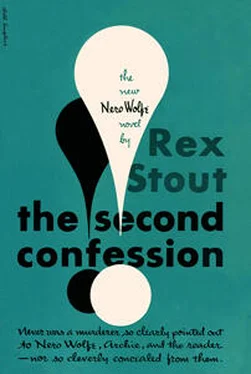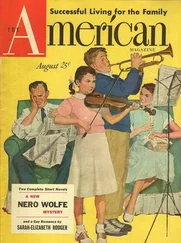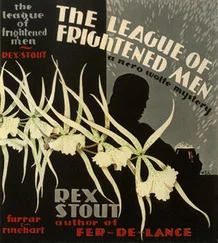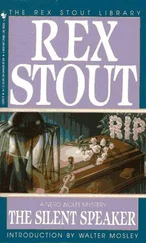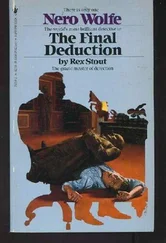Rex Stout - The Second Confession
Здесь есть возможность читать онлайн «Rex Stout - The Second Confession» весь текст электронной книги совершенно бесплатно (целиком полную версию без сокращений). В некоторых случаях можно слушать аудио, скачать через торрент в формате fb2 и присутствует краткое содержание. Город: New York, Год выпуска: 1949, Издательство: Viking Press, Жанр: Классический детектив, на английском языке. Описание произведения, (предисловие) а так же отзывы посетителей доступны на портале библиотеки ЛибКат.
- Название:The Second Confession
- Автор:
- Издательство:Viking Press
- Жанр:
- Год:1949
- Город:New York
- ISBN:нет данных
- Рейтинг книги:4 / 5. Голосов: 1
-
Избранное:Добавить в избранное
- Отзывы:
-
Ваша оценка:
- 80
- 1
- 2
- 3
- 4
- 5
The Second Confession: краткое содержание, описание и аннотация
Предлагаем к чтению аннотацию, описание, краткое содержание или предисловие (зависит от того, что написал сам автор книги «The Second Confession»). Если вы не нашли необходимую информацию о книге — напишите в комментариях, мы постараемся отыскать её.
actually stirs himself and leaves his house.
The Second Confession — читать онлайн бесплатно полную книгу (весь текст) целиком
Ниже представлен текст книги, разбитый по страницам. Система сохранения места последней прочитанной страницы, позволяет с удобством читать онлайн бесплатно книгу «The Second Confession», без необходимости каждый раз заново искать на чём Вы остановились. Поставьте закладку, и сможете в любой момент перейти на страницу, на которой закончили чтение.
Интервал:
Закладка:
Wolfe took his time about getting his shirttail in and putting on his tie and vest and jacket. We went along the hall to the stairs, and down, and took the complicated route to the library without seeing a soul, and I supposed they had already assembled for the meeting, but they hadn’t. When we entered there were only three people there: the District Attorney, the Chairman of the Board, and Webster Kane. Again Archer had copped the best chair and Wolfe had to take a second choice. I was surprised to see Webster Kane and not to see Ben Dykes, and pleased not to see Madeline. Maybe there would still be time for me to finagle a priority on her idea.
Wolfe spoke to Archer. “I congratulate you, sir, on your good judgment. I knew that Mr. Goodwin was incapable of such a shenanigan, but you didn’t. You had to use your brain, and you did so.”
Archer nodded. “Thanks. I tried to.” He looked around. “I had a bad afternoon in court, and I’m tired. I shouldn’t be here, but I said I’d come. I’m turning this matter over to Mr. Gurran, one of my assistants, who is a much better investigator than I am. He was tied up today and couldn’t come with me, but he would like to come and talk with all of you tomorrow morning. Meanwhile—”
“May I say something?” Sperling put in.
“Certainly. I wish you would.”
Sperling spoke easily, with no tension in his voice or manner. “I’d like to tell you exactly what happened. When Dykes came in this morning and said he had evidence that it was Wolfe’s car, I thought that settled it. I believe I said so. Naturally I thought it was Goodwin, knowing that he had driven to Chappaqua last evening. Then when I learned that you weren’t satisfied that it was Goodwin, I was no longer myself satisfied, because I knew you would have welcomed that solution if it had been acceptable. I put my mind on the problem as it stood then, with the time limit narrowed as it was, and I remembered something. The best way to tell you about it is to read you a statement.”
Sperling’s hand went to his inside breast pocket and came out with a folded paper. “This is a statement,” he said, unfolding it, “dated today and signed by Mr. Kane. Webster Kane.”
Archer was frowning. “By Kane?”
“Yes. It reads as follows:
“On Monday evening, June 20, 1949, a little before half past nine, I entered the library and saw on Mr. Sperling’s desk some letters which I knew he wanted mailed. I had heard him say so. I knew he was upset about some personal matter and supposed he had forgotten about them. I decided to go to Mount Kisco and mail them in the post office so they would make the early morning train. I left the house by way of the west terrace, intending to go to the garage for a car, but remembered that Nero Wolfe’s car was parked near by, much closer than the garage, and decided to take it instead.
“The key was in the car. I started the engine and went down the drive. It was the last few minutes of dusk, not yet completely dark, and, knowing the drive well, I didn’t switch the lights on. The drive is a little downhill, and I was probably going between twenty and twenty-five miles an hour. As I was approaching the bridge over the brook I was suddenly aware of an object in the drive, on the left side, immediately in front of the car. There wasn’t time for me to realize, in the dim light, that it was a man. One instant I saw there was an object, and the next instant the car had hit it. I jammed my foot on the brake, but not with great urgency, because at that instant there was no flash of realization that I had hit a man. But I had the car stopped within a few feet. I jumped out and ran to the rear, and saw it was Louis Rony. He was lying about five feet back of the car, and he was dead. The middle of him had been completely crushed by the wheels of the car.
“I could offer a long extenuation of what I did then, but it will serve just as well to put it into one sentence and simply say that I lost my head. I won’t try to describe how I felt, but will tell what I did. When I had made certain that he was dead, I dragged the body off the drive and across the grass to a shrub about fifty feet away, and left it on the north side of the shrub, the side away from the drive. Then I went back to the car, drove across the bridge and on to the entrance, turned around, drove back up to the house, parked the car where I had found it, and got out.
“I did not enter the house. I paced up and down the terrace, trying to decide what to do, collecting my nerves enough to go in and tell what had happened. While I was there on the terrace Goodwin came out of the house, crossed the terrace, and went in the direction of the place where the car was parked. I heard him start the engine and drive away. I didn’t know where he was going. I thought he might be going to New York and the car might not return. Anyway, his going away in the car seemed somehow to make up my mind for me. I went into the house and up to my room, and tried to compose my mind by working on an economic report I was preparing for Mr. Sperling.
“This afternoon Mr. Sperling told me that he had noticed that the letters on his desk, ready for mailing, were gone. I told him that I had taken them up to my room, which I had, intending to have them taken to Chappaqua early this morning, but that the blocking of the road by the police, and their guarding of all the cars, had made it impossible. But his bringing up the matter of the letters changed the whole aspect of the situation for me, I don’t know why. I at once told him, of my own free will, all of the facts herein stated. When he told me that the District Attorney would be here later this afternoon, I told him that I would set down those facts in a written signed statement, and I have now done so. This is the statement.”
Sperling looked up. “Signed by Webster Kane,” he said. He stretched forward to hand the paper to the District Attorney. “Witnessed by me. If you want it more detailed I don’t think he’ll have any objection. Here he is — you can ask him.”
Archer took it and ran his eye over it. In a moment he looked up and, with his head to one side, gazed at Kane. Kane met the gaze.”
Archer tapped the paper with a finger. “You wrote and signed this, did you, Mr. Kane?”
“I did,” Kane said clearly and firmly but without bragging.
“Well — you’re a little late with it, aren’t you?”
“I certainly am.” Kane did not look happy, but he was bearing up. The fact that he let his hair do as it pleased was of some advantage to him, for it made it seem less unlikely that the man with the head and face of a young statesman — that is, young for a statesman — would make such a fool of himself. He hesitated and then went on, “I am keenly aware that my conduct was indefensible. I can’t even explain it in terms that make sense to me now. Apparently I’m not as good in a crisis as I would like to think I am.”
“But this wasn’t much of a crisis, was it? An unavoidable accident? It happens to lots of people.”
“I suppose it does — but I had killed a man. It seemed like a hell of a crisis to me.” Kane gestured. “Anyhow, you see what it did to me. It threw me completely off balance.”
“Not completely.” Archer glanced at the paper. “Your mind was working well enough so that when Goodwin went to the car and drove away, down that same drive, only fifteen minutes after the accident, you thought there was a good chance that it would be blamed on him. Didn’t you?”
Kane nodded. “I put that in the statement deliberately, even though I knew it could be construed like that. I can only say that if that thought was in my mind I wasn’t conscious of it. How did I put it?”
Archer looked at the paper. “Like this: ‘His going away in the car seemed somehow to make up my mind for me. I went into the house and up to my room,’ and so on.”
Читать дальшеИнтервал:
Закладка:
Похожие книги на «The Second Confession»
Представляем Вашему вниманию похожие книги на «The Second Confession» списком для выбора. Мы отобрали схожую по названию и смыслу литературу в надежде предоставить читателям больше вариантов отыскать новые, интересные, ещё непрочитанные произведения.
Обсуждение, отзывы о книге «The Second Confession» и просто собственные мнения читателей. Оставьте ваши комментарии, напишите, что Вы думаете о произведении, его смысле или главных героях. Укажите что конкретно понравилось, а что нет, и почему Вы так считаете.
